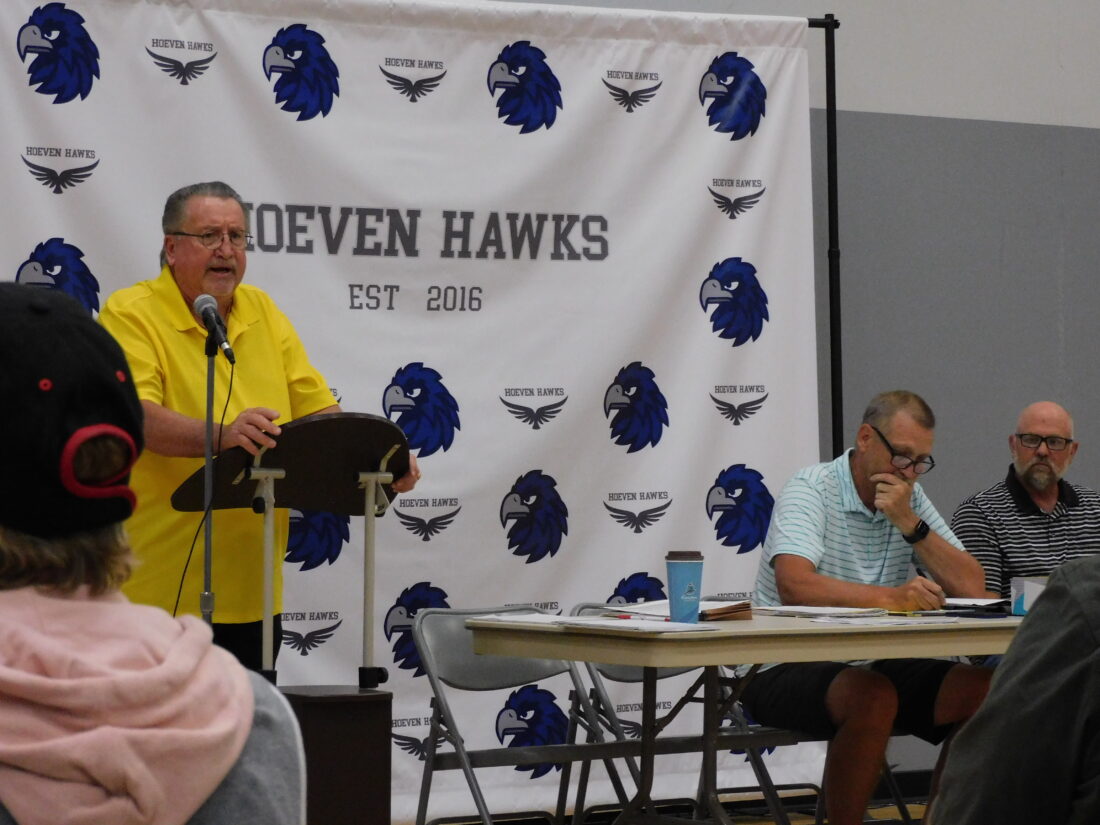Mobile home bill of rights explained
New law to come into effect Aug. 1

Charles Crane/MDN Kent French, director of government affairs for the Manufactured Homes Association of North Dakota, speaks at a townhall meeting with Bismarck attorney Todd Kranda and District 3 Sen. Bob Paulson at John Hoeven Elementary on June 21, explaining and clarifying recent mobile homeowner rights legislation.
The residents of Minot mobile home parks turned out for a townhall meeting at John Hoeven Elementary on June 21 for an explainer on recent legislation that state lawmakers and proponents say is unique in the realm of tenants’ rights in the United States.
The meeting was led by Kent French, the director of government affairs for the Manufactured Homes Association of North Dakota, who was a booster of the legislation. French had fielded a deluge of calls and complaints from Minot communities in the last few years concerning landlords, owners and out-of-state corporations and entities that he said, “are attempting to circumvent the intent of the law” passed in the 2021 legislative assembly.
French, who was joined by Bismarck attorney Todd Kranda, District 3 Sen. Bob Paulson and District 38 Rep. Dan Ruby, spoke at length about the ins and outs of the new bill, for which he was called, “the driving force.”
“When I get home tomorrow to Bismarck, all of the emails, all of the letters, I put it in one pile in my office for two years – almost three years now. I have to tiptoe around stuff to get into my office and it’s all from Minot, North Dakota,” French said. “I have gotten so much information from you folks, and I appreciate that. That is why we’re here today. If you wouldn’t have called, if you wouldn’t have told me what the problems are, we wouldn’t have gotten the legislation passed.”
The legislation goes into effect on Aug. 1 and increases financial penalties assessed by the Department of Health, allows the suspension of licenses for park owners who have fallen out of compliance with the law, and increases the minimum and maximum damages that tenants can be awarded in civil and small claims court proceedings. The culmination of six years of effort and outreach, French said, Senate Bill 2243 was supported almost unanimously in both houses to address the variety of ongoing issues being reported by tenants and to force more transparency on the ownership of the many mobile home communities in the state.
Residents heard first about the new transparency requirements for owners and managers, but most of the time was spent breaking down the new avenues available for tenants to pursue damages and settle disputes with owners and management companies in small claims court.
The crowd had questions on everything from neglected leaking water pipes, the vagaries of the eviction process, utility billing, to leases that sometimes haven’t been updated in more than 20 years. While some attendees were discouraged to hear the industry was not going to be actively regulated by the Department of Health, the department does have the power to suspend or to not award or renew a license in an administrative process that does not involve tenants.
That said, attendees were urged to consider the possibilities of mass individual civil action against an owner violating the new laws, which he said have been given more teeth through increased damages and awarded fees.
“You might find an attorney who will say, ‘I will get you those damages plus I’ll get coverage for my fees,'” Kranda said. “You’ll be able to recover that, and the judges are liable to give that to you. But you as a tenant, you have to document and provide proof of the violations. If the park is violating anything in the new law or 2021 law, you must provide documents as best as you can for the attorney. You can join as a group and go in district court all together against them or go after them in small claims court.”
Legislation passed in 2021 limited potential damages to $1,000. The new bill raised minimum damages to $2,500 and but not to exceed $10,000. Owners also would be liable for all attorney’s fees and costs for each individual civil or small claims proceeding, which Kranda said would make tenants’ cases more enticing in attracting attorneys to represent them. The district court also will have the ability to suspend a mobile home park license if it is determined that it has not remedied each violation.
“We’ve done all this work. We’ve spent all this money. But there comes a time where you folks have to pick up the mantle and you have to organize and do what you have to do,” French said. “They can be inundated with court proceedings. One of the things people worry about is retaliation, and that’s one of the things we couldn’t address, but that’s something you could address with numbers. They’re not going to want to screw with you.”

